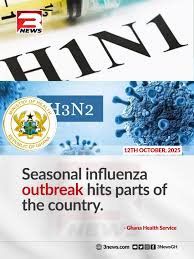
The Ghana Health Service (GHS) has issued a public caution regarding an increase in seasonal influenza (flu) cases across parts of the country.
The GHS confirmed that the country is currently experiencing an increased incidence of seasonal flu, with cases confirmed as influenza A strains H3N2 and H1N1.
These strains are typical of the seasonal flu, which usually peaks during the cooler months.
The highest reported case counts have been recorded in the Greater Accra, Central, Bono, and Eastern Regions.
The GHS noted that these heightened figures might coincide with Ghana’s annual flu season.
Symptoms and high-risk groups
The flu symptoms typically appear suddenly and include a sudden onset of fever, cough, sore throat, runny nose, body aches, headache, and fatigue.
The disease primarily spreads through respiratory droplets from an infected person via coughing, sneezing, talking, and touching contaminated surfaces.
The GHS has identified several groups at higher risk of contracting the disease and experiencing complications:
Children and adolescents, especially those in school sessions.
The elderly.
Pregnant women.
People with chronic illnesses such as asthma, diabetes, and heart disease.
The GHS also noted that high-risk settings where the flu can rapidly spread include schools, dormitories, transport hubs, and markets.
Public Health Response and Prevention
To contain the spread and protect the public, the GHS has outlined a series of recommended personal actions and institutional responses:
What the public should do:
Seek medical care early if flu-like symptoms develop.
Stay home when unwell to avoid spreading the infection.
Practise good hygiene: wash hands regularly with soap and running water, cover coughs/sneezes, and disinfect frequently touched surfaces.
Avoid crowded places and close contact with sick individuals.
Use a face mask when in crowded places.
Health system response:
Enhanced surveillance and rapid diagnostic testing at health facilities.
Updated case management protocols for clinicians.
Public education campaigns through media and community channels.
Coordination with regional health directorates to ensure a timely response.
The Ministry of Health, through the Ghana Health Service, is assuring the public that all necessary measures are being taken to contain these high flu cases, emphasising that public cooperation and the collaboration of stakeholders are vital in protecting individuals, families, and the community.
 Uniquenewsgh.com News, Politics, African News Updates & More
Uniquenewsgh.com News, Politics, African News Updates & More



